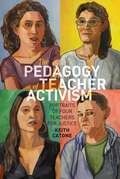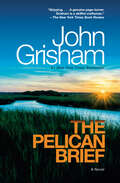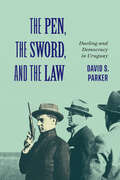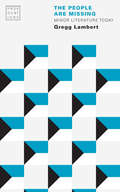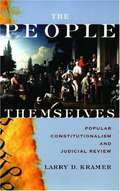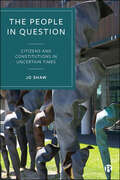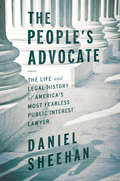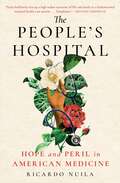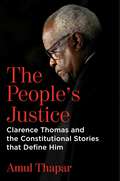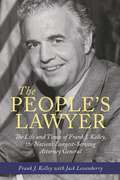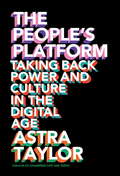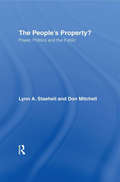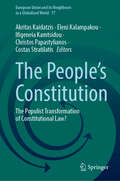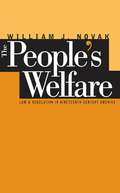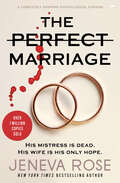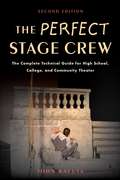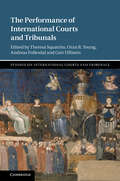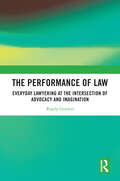- Table View
- List View
The Peacebuilding Puzzle
by Barma Naazneen H.Transformative peace operations fall short of achieving the modern political order sought in post-conflict countries because the interventions themselves empower post-conflict elites intent on forging a neopatrimonial political order. The Peacebuilding Puzzle explains the disconnect between the formal institutional engineering undertaken by international interventions, and the governance outcomes that emerge in their aftermath. Barma's comparative analysis of interventions in Cambodia, East Timor, and Afghanistan focuses on the incentives motivating domestic elites over a sequence of three peacebuilding phases: the elite peace settlement, the transitional governance period, and the aftermath of intervention. The international community advances certain forms of institutional design at each phase in the pursuit of effective and legitimate governance. Yet, over the course of the peacebuilding pathway, powerful post-conflict elites co-opt the very processes and institutions intended to guarantee modern political order and dominate the practice of governance within those institutions to their own ends. This title is also available as Open Access.
The Pedagogy of Teacher Activism: Portraits of Four Teachers for Justice
by Keith C. CatoneThe narratives illuminate how both inner passions and those stirred by caring relationships with others motivate their work, while the intentional ways in which they attempt to disrupt power relations give shape to their approaches to teacher activism. <P><P>Knowing their work will never truly be done and that the road they travel is often difficult, the teacher activists considered here persist because of the hope and possibility that their work might change the world.
The Pelican Brief
by John GrishamIn suburban Georgetown, a killer's Reeboks whisper on the floor of a posh home. In a seedy D.C. porno house, a patron is swiftly garrotted to death. The next day America learns that two of its Supreme Court justices have been assassinated. And in New Orleans, a young law student prepares a legal brief.To Darby Shaw it was no more than a legal shot in the dark, a brilliant guess. To the Washington establishment it's political dynamite. Suddenly Darby is witness to a murder-a murder intended for her. Going underground, she finds that there is only one person-an ambitious reporter after a newsbreak hotter than Watergate-she can trust to help her piece together the deadly puzzle. Somewhere between the bayous of Louisiana and the White House's inner sanctums, a violent cover-up is being engineered. For someone has read Darby's brief-someone who will stop at nothing to destroy the evidence of an unthinkable crime. "Gripping...a genuine page-turner. Grisham is a skilful craftsman." - The New York Times (P)1992 Random House, LLC
The Pelican Brief: A Novel (Penguin Readers)
by John Grisham#1 NEW YORK TIMES BESTSELLER • The classic legal thriller that inspired the blockbuster film starring Julia Roberts and Denzel Washington &“There is a propulsiveness to [Grisham&’s] narrative that keeps the pages turning briskly.&”—People In suburban Georgetown, a killer&’s Reeboks whisper on the floor of a posh home. In a seedy D.C. porno house a patron is swiftly garroted to death. The next day America learns that two of its Supreme Court justices have been assassinated. And in New Orleans a young law student prepares a legal brief. . . .To Darby Shaw it was no more than a legal shot in the dark, a brilliant guess. To the Washington establishment it was political dynamite. Suddenly Darby is witness to a murder—a murder intended for her. Going underground, she finds there is only one person she can trust—an ambitious reporter after a newsbreak hotter than Watergate—to help her piece together the deadly puzzle.Somewhere between the bayous of Louisiana and the White House&’s inner sanctums, a violent cover-up is being engineered. For someone has read Darby&’s brief. Someone who will stop at nothing to destroy the evidence of an unthinkable crime.
The Pen, the Sword, and the Law: Dueling and Democracy in Uruguay (McGill-Queen's Iberian and Latin American Cultures Series)
by David S. ParkerThe duel, and the codes of honour that governed duelling, functioned for decades in many European and Latin American countries as a shadow legal system, regulating in practice what legislators felt free to say and what journalists felt free to write. Yet the duel was also an act of potentially deadly violence and a challenge to the authority of statutory law.When duelling became widespread in early twentieth-century Uruguay, legislators facing this dilemma chose the unique and radical path of legalization. The Pen, the Sword, and the Law explores how the only country in the world to decriminalize duelling managed the tension between these informal but widely accepted “gentlemanly laws” and its own criminal code. The duel, which remained legal until 1992, was meant to ensure civility in politics and decorum in the press, but it often failed to achieve either. Drawing on rich and detailed newspaper reports of duels and challenges, parliamentary debates, legal records, private papers, and interviews, David Parker examines the role of pistols and sabres in shaping the everyday workings of a raucous public sphere. Demonstrating that the duel was no simple throwback to archaic conceptions of masculine honour and chivalry, The Pen, the Sword, and the Law illustrates how duelling went hand in hand with democracy and freedom of the press in one of South America’s most progressive nations.
The Pentagon Papers: The Secret History of the Vietnam War
by Neil Sheehan Fox Butterfield Hedrick Smith E. W. Kenworthy James L. Greenfield“The WikiLeaks of its day” (Time) is as relevant as ever to present-day American politics.“The most significant leaks of classified material in American history.” –The Washington PostNot Fake News! The basis for the 2018 film The Post by Academy Award-winning director Steven Spielberg, The Pentagon Papers are a series of articles, documents, and studies examining the Johnson Administration’s lies to the public about the extent of US involvement in the Vietnam War, bringing to light shocking conclusions about America’s true role in the conflict.Published by The New York Times in 1971, The Pentagon Papers riveted an already deeply divided nation with startling and disturbing revelations about the United States' involvement in Vietnam. The Washington Post called them “the most significant leaks of classified material in American history” and they remain relevant today as a reminder of the importance of a free press and First Amendment rights. The Pentagon Papers demonstrated that the government had systematically lied to both the public and to Congress.This incomparable, 848-page volume includes:The Truman and Eisenhower Years: 1945-1960 by Fox ButterfieldOrigins of the Insurgency in South Vietnam by Fox ButterfieldThe Kennedy Years: 1961-1963 by Hedrick SmithThe Overthrow of Ngo Dinh Diem: May-November, 1963 by Hedrick SmithThe Covert War and Tonkin Gulf: February-August, 1964 by Neil SheehanThe Consensus to Bomb North Vietnam: August, 1964-February, 1965 by Neil SheehanThe Launching of the Ground War: March-July, 1965 by Neil SheehanThe Buildup: July, 1965-September, 1966 by Fox ButterfieldSecretary McNamara’s Disenchantment: October, 1966-May, 1967 by Hedrick SmithThe Tet Offensive and the Turnaround by E. W. Kenworthy Analysis and CommentCourt RecordsBiographies of Key FiguresWith a brand-new foreword by James L. Greenfield, this edition of the Pulitzer Prize–winning story is sure to provoke discussion about free press and government deception, and shed some light on issues in the past and the present so that we can better understand and improve the future.
The People Are Missing: Minor Literature Today (Provocations)
by Gregg Lambert&“The people are missing&” is a constant refrain in Gilles Deleuze and Félix Guattari&’s writings after the 1975 publication of Kafka: Pour une litterature mineure. With the translation of this work into English (Kafka: Toward a Minor Literature) in 1986, the refrain quickly became a hallmark of political interpretation in the North American academy and was especially applied to the works of minorities and postcolonial writers. However, in the second cinema book, Cinéma 2: L&’Image-temps, the refrain is restricted to third-world cinema, in which Deleuze and Guattari locate the conditions of truly postwar political cinema: the absence, even the impossibility, of a people who would constitute its organic community. In this critical reflection, Gregg Lambert traces the &“narrowing&” of the refrain itself, as well as the premise that the act of art is capable of inventing the conditions of a &“people&” or a &“nation,&” and asks whether this results only in reducing the positive conditions of art and philosophy in the postmodern period. Lambert offers an unprecedented inquiry into the evolution of Deleuze&’s hopes for the revolutionary goals of minor literature and the related notion of the missing people in the conjuncture of contemporary critical theory.
The People Themselves: Popular Constitutionalism and Judicial Review
by Larry D. KramerIn this groundbreaking interpretation of America's founding and of its entire system of judicial review, Larry Kramer reveals that the colonists fought for and created a very different system-- and held a very different understanding of citizenship-- than Americans believe to be the norm today. "Popular sovereignty" was not just some historical abstraction, and the notion of "the people" was more than a flip rhetorical device invoked on the campaign trail. Questions of constitutional meaning provoked vigorous public debate and the actions of government officials were greeted with celebratory feasts and bonfires, or riotous resistance. Americans treated the Constitution as part of the lived reality of their daily existence. Their self-sovereignty in law as much as politics was active, not abstract.
The People in Question: Citizens and Constitutions in Uncertain Times
by Jo ShawAt a time of rising populism and debate about immigration, leading legal academic Jo Shaw sets out to review interactions between constitutions and constructs of citizenship. This incisive appraisal is the first sustained treatment of the relationship between citizenship and constitutional law in a comparative and transnational perspective. Drawing on examples from around the world, it assesses how countries’ legal, political and cultural processes help to determine the boundaries of citizenship. For students and academics across political, social and international disciplines, Shaw offers an accessible response to some of the most pressing international questions of our age.
The People's Advocate: The Life and Legal History of America's Most Fearless Public Interest Lawyer
by Daniel SheehanThe People's Advocate is the autobiography of American Constitutional Trial Attorney Daniel Sheehan. Sheehan traces his personal journey from his working-class roots through Harvard Law School and his initial career in private practice. His early disenchantment led to his return for further study at Harvard Divinity School, and rethinking the nature of his career. Eventually his role as President and Chief Trial Counselor for the famous Washington, D.C.-based Christic Institute would help define his role as America's preeminent cause lawyer.In The People's Advocate, Sheehan details "the inside story" of over a dozen historically significant American legal cases of the 20th Century, all of which he litigated. The remarkable cases covered in the book include both The Pentagon Papers Case in 1971 and The Watergate Burglary Case in 1973. In addition, Sheehan served as the Chief Attorney on The Karen Silkwood Case in 1976, which additionally revealed the C.I.A.'s Israeli Desk had been smuggling 98% bomb-grade plutonium to the State of Israel and to Iran. In 1984, he was the Chief Trial Counsel on The American Sanctuary Movement Case, establishing the right of American church workers to provide assistance to Central American political refugees fleeing Guatemalan and Salvadorian "death squads." His involvement with the sanctuary movement ultimately led to Sheehan's famous Iran/Contra Federal Civil Racketeering Case against the Reagan/Bush Administration, which he investigated, initiated, filed, and then litigated. The resulting "Iran/Contra Scandal" nearly brought down that Administration, leading Congress to consider the impeachment over a dozen of the top-ranking officials of the Reagan/Bush Administration.The People's Advocate is the "real story" of these and many other historic American cases, told from the unique point of view of a central lawyer.
The People's Hospital: Hope and Peril in American Medicine
by M.D. Ricardo Nuila&“Nuila&’s storytelling gifts place him alongside colleagues like Atul Gawande.&” —Los Angeles Times This &“compelling mixture of health care policy and gripping stories from the frontlines of medicine&” (The Guardian) explores the question: where does an uninsured person go when turned away by hospitals, clinics, and doctors?Here, we follow the lives of five uninsured Houstonians as their struggle for survival leads them to a hospital that prioritizes people over profit. First, we meet Stephen, the restaurant franchise manager who signed up for his company&’s lowest priced plan, only to find himself facing insurmountable costs after a cancer diagnosis. Then Christian—a young college student and retail worker who can&’t seem to get an accurate diagnosis, let alone treatment, for his debilitating knee pain. Geronimo, thirty-six years old, has liver failure, but his meager disability check disqualifies him for Medicaid—and puts a life-saving transplant just out of reach. Roxana, who&’s lived in the community without a visa for more than two decades, suffers from complications related to her cancer treatment. And finally, there&’s Ebonie, a young mother whose high-risk pregnancy endangers her life. Whether due to immigration status, income, or the vagaries of state Medicaid law, all five are denied access to care. For all five, this exclusion could prove life-threatening. Each patient eventually lands at Ben Taub, the county hospital where Dr. Nuila has worked for over a decade. Nuila delves with empathy into the experiences of his patients, braiding their dramas into a singular narrative that contradicts the established idea that the only way to receive good health care is with good insurance. As readers follow the moving twists and turns in each patient&’s story, it&’s impossible to deny that our system is broken—and that Ben Taub&’s innovative model, where patient care is more important than insurance payments, could help light the path forward.
The People's Justice: Clarence Thomas and the Constitutional Stories that Define Him
by Amul Thapar"Amul Thapar sets the record straight with this can't-put-down series of stories that reveal the courage, decency, and humanity of the man behind what many are calling the Thomas Court." —Megyn Kelly, journalist"Amul Thapar has done what even gifted law professors and professional 'Court watchers' often fail to do: Thapar has focused on the men and women whose lives are before the nine and on how one justice, Clarence Thomas, has carefully, consistently, and compassionately applied his understanding of the Constitution to those lives." — Hugh Hewitt, host of The Hugh Hewitt Show and professor of lawFor thirty years, Clarence Thomas has been denounced as the &“cruelest justice,&” a betrayer of his race, an ideologue, and the enemy of the little guy. In this compelling study of the man and the jurist, Amul Thapar demolishes that caricature. Every day, Americans go to court. Invoking the Constitution, they fight for their homes, for a better education for their children, and to save their cities from violence. Recounting the stories of a handful of these ordinary Americans whose struggles for justice reached the Supreme Court, Thapar shines new light on the heart and mind of Clarence Thomas. A woman in debilitating pain whose only effective medication has been taken away by the government, the motherless children of a slain police officer, victims of sexual assault— read their eye-opening stories, stripped of legalese, and decide for yourself whether Thomas&’s originalist jurisprudence delivers equal justice under law. &“Finding the right answer,&” Justice Thomas has observed, &“is often the least difficult problem.&” What is needed is &“the courage to assert that answer and stand firm in the face of the constant winds of protest and criticism.&” That courage—along with wisdom and compassion—shines out from every page of The People&’s Justice. At the heart of this book is the question: Would you want to live in Justice Thomas&’s America? After reading these stories, even his critics might be surprised by their answer.
The People's Lawyer: The Life and Times of Frank J. Kelley, the Nation's Longest-Serving Attorney General (Painted Turtle)
by Frank J. Kelley Jack LessenberryAfter several years as a small-town lawyer in Alpena, Frank J. Kelley was unexpectedly appointed Michigan's attorney general at the end of 1961. He never suspected that he would continue to serve until 1999, a national record. During that time, he worked with everyone from John and Bobby Kennedy to Bill Clinton and jump-started the careers of dozens of politicians and public figures, including U.S. Senator Carl Levin and Governors James Blanchard and Jennifer Granholm. In The People's Lawyer: The Life and Times of Frank J. Kelley, the Nation's Longest-Serving Attorney General, Kelley and co-author Jack Lessenberry reflect on the personal and professional journey of the so-called godfather of the Michigan Democratic Party during his incredible life and thirty-seven years in office. The People's Lawyer chronicles Kelley's early life as the son of second-generation Irish immigrants, whose father, Frank E. Kelley, started out as a Detroit saloon keeper and became a respected Democratic Party leader. Kelley tells of becoming the first of his family to go to college and law school, his early days as a lawyer in northern Michigan, and how he transformed the office of attorney general as an active crusader for the people. Among other accomplishments, Kelley describes establishing the first Office of Consumer Protection in the country, taking on Michigan's public utility companies, helping to end racially restrictive real estate practices, and helping to initiate the multibillion-dollar Tobacco Master Settlement Agreement in 1998. Kelley frames his work against a backdrop of the social and political upheaval of his times, including the 1967 Detroit riots, the disappearance of Jimmy Hoffa, and the assassinations of John F. Kennedy, Robert F. Kennedy, and Martin Luther King, Jr. All those interested in American history and legal history will enjoy this highly readable, entertaining account of Kelley's life of public service.
The People's Platform
by Astra TaylorFrom a cutting-edge cultural commentator and documentary filmmaker, a bold and brilliant challenge to cherished notions of the Internet as the great democratizing force of our age. The Internet has been hailed as a place where all can be heard and everyone can participate equally. But how true is this claim? In a seminal dismantling of techno-utopian visions, The People's Platform argues that for all that we "tweet" and "like" and "share," the Internet in fact reflects and amplifies real-world inequities at least as much as it ameliorates them. Online, just as off-line, attention and influence largely accrue to those who already have plenty of both. What we have seen in the virtual world so far, Astra Taylor says, has been not a revolution but a rearrangement. Although Silicon Valley tycoons have eclipsed Hollywood moguls, a handful of giants like Amazon, Apple, Google and Facebook still dominate our lives. And the worst habits of the old media model--the pressure to be quick and sensational, to seek easy celebrity, to appeal to the broadest possible public--have proliferated online, where every click can be measured and where "aggregating" the work of others is the surest way to attract eyeballs and ad revenue. In a world where culture is "free," creative work has diminishing value, and advertising fuels the system, the new order looks suspiciously just like the old one. We can do better, Taylor insists. The online world does offer an unprecedented opportunity, but a democratic culture that supports diverse voices, work of lasting value, and equitable business practices will not appear as a consequence of technology alone. If we want the Internet to truly be a people's platform, we will have to make it so.
The People's Property?: Power, Politics, and the Public.
by Donald Mitchell Lynn StaeheliThe People’s Property? is the first book-length scholarly examination of how negotiations over the ownership, control, and peopling of public space are central to the development of publicity, citizenship, and democracy in urban areas. The book asks the questions: Why does it matter who owns public property? Who controls it? Who is in it? Donald Mitchell and Lynn A. Staeheli answer the questions by focusing on the interplay between property (in its geographical sense, as a parcel of owned space) and people. Property rights are often defined as the "right to exclude." It is important, therefore, to understand who (what individual and corporate entities, governed by what kinds of regulations and restrictions) owns publicly accessible property. It is likewise important to understand the changing bases for excluding some people and classes of people from otherwise publicly accessible property. That is to say, it is important to understand how modes of access and possibilities for association in publicly accessible space vary for different individuals and different classes of people, if we are to understand the role public spaces play in shaping democratic possibilities. In what ways are urban public spaces "the people’s property" – and in what ways are they not? What does this mean for citizenship and the constitution of an inclusive, democratic polity? The book develops its argument through five case studies: protest in Washington DC; struggles over the Plaza of Santa Fe, NM; homelessness and property redevelopment in San Diego, CA; the enclosure of public space in a mall in Syracuse, NY; and community gardens in New York City. Though empirically focused on the US, the book is of broader interests as publics in all liberal democracies are under-going rapid reconsideration and transformation.
The People’s Constitution: The Populist Transformation of Constitutional Law? (European Union and its Neighbours in a Globalized World #17)
by Costas Stratilatis Akritas Kaidatzis Eleni Kalampakou Ifigeneia Kamtsidou Christos PapastylianosThe book explores in both theory and practice the challenges that various forms of populism pose to the dominant understandings of democratic representation and liberal constitutionalism. The volume brings together conceptual, analytical, and empirical dimensions of the relationship between populism and constitutional democracy. Moving beyond the dominant depiction of populism as “anti-pluralist”, scholars of legal and political theory, both well-known and early career researchers, discuss the paradoxes of constitutional democracy that populism brings to the surface, the complex role of the judiciary both as an enemy and as a potential ally of populism, the relationship between economic power and populism and ultimately the impasses of liberalism that populism forces us to revisit. These are highly topical issues that they have not been sufficiently explored in the literature. A significant asset of the volume is that it includes chapters on empirical studies from under-explored cases such as Southern Europe and the Balkans. Thus, the volume poses an original contribution to the existing literature on constitutional populism. Its originality along with the high quality of the research will make this book necessary for any constitutional and political theorist who aims to delve into the relationship between constitutionalism and populism.
The People’s Welfare
by William J. NovakMuch of today's political rhetoric decries the welfare state and our maze of government regulations. Critics hark back to a time before the state intervened so directly in citizens' lives. In The People's Welfare, William Novak refutes this vision of a stateless past by documenting America's long history of government regulation in the areas of public safety, political economy, public property, morality, and public health. Challenging the myth of American individualism, Novak recovers a distinctive nineteenth-century commitment to shared obligations and public duties in a well-regulated society. Novak explores the by-laws, ordinances, statutes, and common law restrictions that regulated almost every aspect of America's society and economy, including fire regulations, inspection and licensing rules, fair marketplace laws, the moral policing of prostitution and drunkenness, and health and sanitary codes. Based on a reading of more than one thousand court cases in addition to the leading legal and political texts of the nineteenth century, The People's Welfare demonstrates the deep roots of regulation in America and offers a startling reinterpretation of the history of American governance.
The Perfect Alibi: A Novel (Robin Lockwood #2)
by Phillip MargolinThe “master of heart-pounding suspense”—New York Times bestseller Phillip Margolin—returns with a new legal thriller starring Robin Lockwood. A young woman accuses a prominent local college athlete of rape. Convicted with the help of undisputable DNA evidence, the athlete swears his innocence and threatens both his lawyer and his accuser as he's sent to prison. Not long after, there's another rape and the DNA test shows that the same person committed both rapes—which is seemingly impossible since the man convicted of the first rape was in prison at the time of the second one. Now, the convicted athlete, joined by a new lawyer, is granted a new trial and bail. Shortly thereafter, his original lawyer disappears and his law partner is murdered. Robin Lockwood is a young lawyer with a prestigious small law firm and a former MMA fighter who helped pay for Yale Law School with her bouts. She is representing the victim of the first rape for her civil lawsuit against her rapist, who is now convinced the rapist is stalking her and trying to intimidate her. At the same time, another client is up on a murder charge—one that should be dismissed as self-defense—but the D.A. trying the case is determined to bring it to trial. Now she has to mastermind two impossible cases, trying to find the hidden truth that links the two of them. Phillip Margolin, the master of the legal thriller, returns in one of his twistiest, most compelling crime novels yet.
The Perfect Divorce: An absolutely gripping and brilliantly twisty thriller from multi-million-copy bestseller Jeneva Rose
by Jeneva RoseTill death do us part. Yours. Not Mine.It's been eleven years since high-powered attorney Sarah Morgan defended her husband, Adam, against the charge of murdering his mistress. Sarah haslong since moved on, starting a family with her new husband, Bob Miller, and changing careers. Her life is back to being exactly how she always wanted ... or is it?After discovering Bob engaged in a one-night stand, Sarah wastes no time filing for divorce. However, amid their ugly separation, new DNA evidence is uncovered in the case against Adam, forcing the police to reopen the investigation and putting Sarah right back in the spotlight. Everyone wants to know what really happened, most of all former Deputy Hudson, who is hell-bent on finding the truth.But when the woman Bob slept with is reported missing, he and Sarah start to fight dirty, and a high-stakes game of cat and mouse ensues. Filled with page-turning suspense and Jeneva Rose's signature twists and turns, this sequel will have readers wondering: Can Bob and Sarah achieve the perfect divorce? Or will it be "'til death do us part"?
The Perfect Marriage: A Completely Gripping Psychological Suspense
by Jeneva RoseOne million sold: “A tantalizing premise . . . twists at every turn . . . [A] masterful debut about betrayal and justice&” by a New York Times-bestselling author (Samantha M. Bailey, #1 national bestselling author of Watch Out for Her).Optioned by Picture Perfect Federation for development as a film or TV series Sarah Morgan is a successful and powerful defense attorney in Washington D.C. As a named partner at her firm, life is going exactly how she planned. The same cannot be said for her husband, Adam. He’s a struggling writer who has had little success in his career and he tires of his and Sarah’s relationship as she is constantly working. Out in the secluded woods, at the couple’s lake house, Adam engages in a passionate affair with Kelly Summers. But one morning everything changes. Kelly is found brutally stabbed to death and now, Sarah must take on her hardest case yet, defending her own husband, a man accused of murdering his mistress. The Perfect Marriage is a juicy, twisty, and utterly addictive thriller that will keep you turning pages. You won’t see the ending coming . . . guaranteed!&“Everything I want in a thriller. Sexy, shocking, and tense with an ending I never saw coming. Jeneva Rose is the queen of twists.&” —Colleen Hoover, #1 New York Times–bestselling author on You Shouldn’t Have Come Here &“A twisty, compulsive book that will keep you reading all night! Fast-paced with crisp writing and an intriguing plot. Jeneva Rose is one to watch.&” —Samantha Downing, #1 international bestselling author of My Lovely Wife &“A book to be read in one gulp—this dastardly debut flies to a shocking reveal. I couldn’t put it down; I had to see what happened. Twists galore.&” —J.T. Ellison, New York Times–bestselling author of Her Dark Lies. <b>New York Times Bestseller</b>
The Perfect Stage Crew: The Complete Technical Guide for High School, College, and Community Theater
by John KalutaHere is a must-have book for anyone producing a stage show without a Broadway-sized budget. Written by a technical theater veteran, The Perfect Stage Crew explains the pitfalls to avoid and provides solutions to the most common-and the most complex-stage performance problems, even for theaters with a lack of resources. An invaluable guide for middle and high school theaters, college theaters, and community theaters, The Perfect Stage Crew teaches readers how to:Stock, organize, and store the essential backstage suppliesConceptualize, design, and build setsManage a stage crew effectivelyPaint scenery and backdropsTest, design, and hang lightingOperate and repair sound equipmentSet cuesPromote your showThis expanded second edition covers up-to-date technology, including for use with recording, sound, and lighting. Chapters also cover such crucial topics as running technical rehearsals, gathering props, and creating and selling tickets. Theater groups that need to learn the nuts and bolts of putting a show together will discover how to turn backstage workers into The Perfect Stage Crew.Allworth Press, an imprint of Skyhorse Publishing, publishes a broad range of books on the visual and performing arts, with emphasis on the business of art. Our titles cover subjects such as graphic design, theater, branding, fine art, photography, interior design, writing, acting, film, how to start careers, business and legal forms, business practices, and more. While we don't aspire to publish a New York Times bestseller or a national bestseller, we are deeply committed to quality books that help creative professionals succeed and thrive. We often publish in areas overlooked by other publishers and welcome the author whose expertise can help our audience of readers.
The Perfect Witness
by Barry SiegelMurder. Courtroom suspense. Unforgettable characters. A California town drenched in fog and secrecy. Barry Siegel delivers one of the most original and exciting legal thrillers in years. They used to be partners: Greg Monarch and Ira Sullivan, a couple of do-good lawyers in the central California town of La Graciosa. Ira, the charmer who glided through life. Greg, ever the searching idealist. But it all went bad for Ira. Bad enough that he wakes up in jail one day staring at a death sentence for murder. And he can't remember if he's the killer. Only Greg Monarch has a prayer of getting him off--if he's willing to cross certain ethical lines. Just how far should he go to save his former partner? As Greg Monarch wrestles with that question, he finds himself inexorably drawn into an ever-widening web of deceit and intrigue. The stakes are much higher then he first imagined; the forces gathering against Ira reach well beyond their coastal hamlet. Layer by layer, Greg peels back a tissue of lies--and at the rotten core he comes to Sandy Polson. A self-possessed beauty with a shady past, Sandy is the kind of woman who can look you deep in the eyes and make you believe anything. Sandy says she was with Ira the night of the murder, says she saw the whole thing. The prosecution believes she's the perfect witness. But what if Monarch could persuade Sandy to tell the truth? Wouldnt Sandy then become the perfect witness for the defense? A spellbinding story of crime and punishment, betrayal and revenge, Barry Siegel's new novel is a compelling journey into the heart of the courtroom and the human soul.
The Performance of International Courts and Tribunals (Studies on International Courts and Tribunals)
by Oran R. Young Geir Ulfstein Theresa Squatrito Andreas FollesdalInternational courts and tribunals now operate globally and in several world regions, playing significant roles in international law and global governance. However, these courts vary significantly in terms of their practices, procedures, and the outcomes they produce.<P><P> Why do some international courts perform better than others? Which factors affect the outcome of these courts and tribunals? <P>The Performance of International Courts and Tribunals is an interdisciplinary study featuring approaches, methods and authorship from law and political science, which proposes the concept of performance to describe the processes and outcomes of international courts. It develops a framework for evaluating and explaining performance by offering a broad comparative analysis of international courts, covering several world regions and the areas of trade, investment, the environment, human rights and criminal law, and offers interdisciplinary accounts to explain how and why international court performance varies.<P>Features approaches, methods and authorship from law and political science.<P> Introduces a framework for evaluating performance of international courts and tribunals.<P> Offers original interdisciplinary perspectives.<P>
The Performance of Law: Everyday Lawyering at the Intersection of Advocacy and Imagination
by Randy GordonThis book considers how law is always enacted, or performed, in ways that can be analyzed in relation to fiction, theatre, and other dramatic forms. Of necessity, lawyers and judges need to devise techniques to make rules respond situationally. The performance of law supplements, or it extends the reach of, the law-as-written. And, in this respect, the act of lawyering is in many ways an instantiation of acts often associated with, for example, literature and the plastic and performing arts. Combining legal theory and legal practice, this book maintains that the modes of enquiry found in, and applied to, novels, paintings, and plays can help us understand how things like legal arguments and trials work—or don’t. As such, and through the examination of a wide range of both historical and fictional legal cases, the book pursues an interdisciplinary analysis of how law is performed; and, moreover, how legal performances can be accomplished ethically. This book will appeal to scholars and students in sociolegal studies, legal theory, and jurisprudence, as well as those teaching and training in legal practice.
The Perilous Public Square: Structural Threats to Free Expression Today
by David E. PozenAmericans of all political persuasions fear that “free speech” is under attack. This may seem strange at a time when legal protections for free expression remain strong and overt government censorship minimal. Yet a range of political, economic, social, and technological developments have raised profound challenges for how we manage speech. New threats to political discourse are mounting—from the rise of authoritarian populism and national security secrecy to the decline of print journalism and public trust in experts to the “fake news,” trolling, and increasingly subtle modes of surveillance made possible by digital technologies.The Perilous Public Square brings together leading thinkers to identify and investigate today’s multifaceted threats to free expression. They go beyond the campus and the courthouse to pinpoint key structural changes in the means of mass communication and forms of global capitalism. Beginning with Tim Wu’s inquiry into whether the First Amendment is obsolete, Matthew Connelly, Jack Goldsmith, Kate Klonick, Frederick Schauer, Olivier Sylvain, and Heather Whitney explore ways to address these dangers and preserve the essential features of a healthy democracy. Their conversations with other leading thinkers, including Danielle Keats Citron, Jelani Cobb, Frank Pasquale, Geoffrey R. Stone, Rebecca Tushnet, and Kirsten Weld, cross the disciplinary boundaries of First Amendment law, internet law, media policy, journalism, legal history, and legal theory, offering fresh perspectives on fortifying the speech system and reinvigorating the public square.

